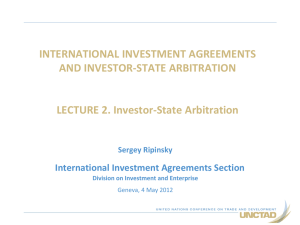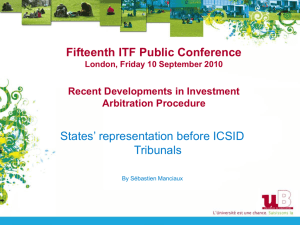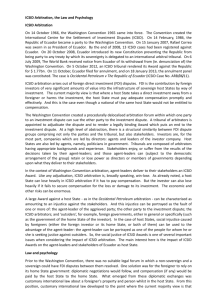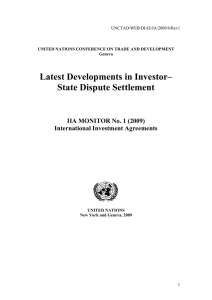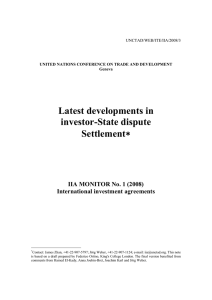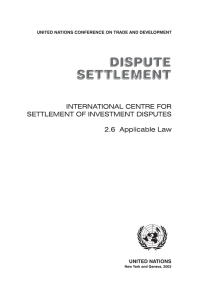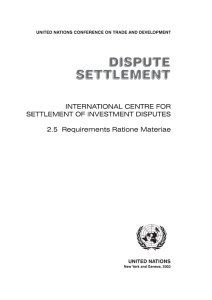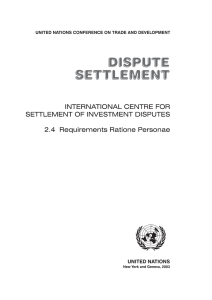Die Rücknahme gemeinschaftswidriger Verwaltungsakte durch
advertisement
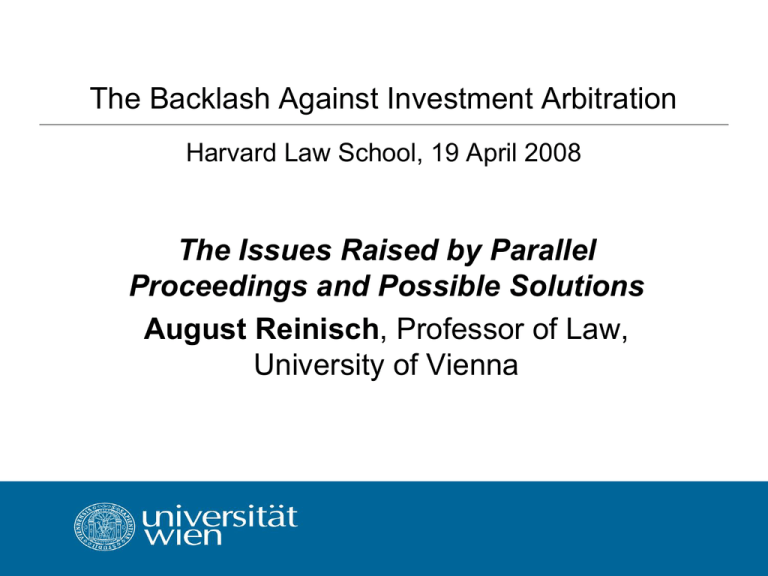
The Backlash Against Investment Arbitration Harvard Law School, 19 April 2008 The Issues Raised by Parallel Proceedings and Possible Solutions August Reinisch, Professor of Law, University of Vienna LL.M. IN INTERNATIONAL LEGAL STUDIES Overview • Proliferation of international courts and tribunals • Potential threats ensuing from proliferation • Inconsistent awards in investment arbitration – Different degrees of inconsistencies • Possible solutions – From institutionalized to pragmatic responses LL.M. IN INTERNATIONAL LEGAL STUDIES The “Proliferation” of International Courts and Tribunals and Their Increased Activities • Establishment of new institutions: – International Tribunal for the Law of the Sea (ITLOS) – International Criminal Court (ICC) – International Criminal Tribunal for the Former Yugoslavia (ICTY) – International Criminal Tribunal for Rwanda (ICTR) • Strengthening existing dispute settlement mechanisms: – WTO Dispute Settlement Understanding – ICSID LL.M. IN INTERNATIONAL LEGAL STUDIES Potential Threats of the Proliferation of Dispute Settlement Mechanisms • Forum shopping • Duplication or multiplication of proceedings • Divergent outcomes/inconsistent decisions • Fragmentation of international law LL.M. IN INTERNATIONAL LEGAL STUDIES Investment Arbitration Boom • Since the mid-1990s dramatic increase in ICSID, ICSID Additional Facility as well as UNCITRAL and other investment arbitration (LCIA, SCC, PCA, ICC, etc.) • Driving force: so-called treaty arbitration based on more than 2500 bilateral investment treaties (BITs), NAFTA Chapter 11 as well as other investment chapters of Free Trade Agreements and multilateral treaties such as the Energy Charter Treaty. LL.M. IN INTERNATIONAL LEGAL STUDIES BIT Overlap • “86. The Tribunal notes in this respect that the Centre has made every effort possible to avoid a multiplicity of tribunals and jurisdictions, but that it is not possible to foreclose rights that different investors might have under different arrangements. The Tribunal also notes that, while it might be desirable to recognize similar rights to domestic and foreign investors, this is seldom possible in the present state of international law in this field. Finally, it is not for the Tribunal to rule on the perspectives of the negotiation process or on what TGN might do in respect of its shareholders, as these are matters between Argentina and TGN or between TGN and its shareholders.” • CMS v. Argentina, ICSID Case No. ARB/01/8, Decision on Jurisdiction, July 17, 2003, 42 ILM 788 (2003). LL.M. IN INTERNATIONAL LEGAL STUDIES BIT Shopping • “It is not uncommon in practice, and – absent a particular limitation – not illegal to locate one’s operations in a jurisdiction perceived to provide a beneficial regulatory and legal environment in terms, for example, of taxation or the substantive law of the jurisdiction, including the availability of a BIT.” • Aguas del Tunari S.A. v Republic of Bolivia, ICSID Case No. ARB/02/3, Decision on Jurisdiction, 21 October 2005, para. 330. LL.M. IN INTERNATIONAL LEGAL STUDIES Different Degrees of Inconsistencies 1) Investment tribunals may come to different conclusions concerning the same or similar legal issues: SGS cases, Maffezini doctrine 2) Investment tribunals may reach different results concerning the same or similar facts: CMS, LG&E, Sempra, Enron v. Argentina, etc. 3) Investment tribunals may come to opposing results in situations where the same dispute is litigated both by a subsidiary and its parent: CME/Lauder v. Czech Republic LL.M. IN INTERNATIONAL LEGAL STUDIES SGS Cases • Two ICSID tribunals came to opposing conclusions with regard to the meaning of so-called umbrella clauses. While the SGS v. Pakistan tribunal held that via an umbrella clause “breaches of a contract [are not] automatically “elevated” to the level of breaches of international law”, the SGS v. Philippines tribunal found that that an umbrella clause “makes it a breach of the BIT for the host State to fail to observe binding commitments.” LL.M. IN INTERNATIONAL LEGAL STUDIES Maffezini doctrine • In 2000, an ICSID tribunal held that held that a BIT’s MFN-clause was not limited to substantive standards of treatment, but extended to procedural issues and thus permitted an investor to rely on more favorable (i.e. shorter) waiting periods before instituting arbitration which were contained in another BIT of the host State. Subsequent tribunals either endorsed or rejected that view. LL.M. IN INTERNATIONAL LEGAL STUDIES CMS, LG&E and others v. Argentina • Since 2005 ICSID tribunals came to different conclusions as to whether the situation prevailing in Argentina in 2001/2002 constituted a “state of necessity” precluding the wrongfulness of various BIT violations of Argentina as a host State to foreign investments. LL.M. IN INTERNATIONAL LEGAL STUDIES CME/Lauder v. Czech Republic • While the tribunal established pursuant to the Czech Republic/US BIT, Lauder v. Czech Republic, hearing the claim of the controlling US shareholder, found that minor infraction of that treaty did not lead to the liability of the Czech Republic, the tribunal established pursuant to the Czech Republic/Netherlands BIT, CME v. Czech Republic, hearing the claim of the Dutch subsidiary, concluded that various BIT standards had been breached and ultimately found the Czech Republic liable in the amount of almost 500 Mio. US $. LL.M. IN INTERNATIONAL LEGAL STUDIES Possible Ways to Ensure Uniformity • • • • An appellate structure A preliminary reference system Consolidation of proceedings A more liberal use of res judicata and lis pendens • Strengthening the de facto case-law LL.M. IN INTERNATIONAL LEGAL STUDIES An Appellate Structure • Possible Improvements of the Framework for ICSID Arbitration, discussion paper of the ICSID Secretariat dated October 26, 2004. • Genuine Appeal on questions of law – different from the current form of control through annulment of awards by special ad hoc committees pursuant to Article 52 ICSID Convention. • Problem: revision of the ICSID Convention LL.M. IN INTERNATIONAL LEGAL STUDIES A Preliminary Reference System • Blueprint in Article 234 (1) TEC: “The Court of Justice shall have jurisdiction to give preliminary rulings concerning: – the interpretation of the Treaty; – the validity and interpretation of acts of the institutions of the Community […]” LL.M. IN INTERNATIONAL LEGAL STUDIES Consolidation of Proceedings • Consolidation • E.g.: Canfor Corporation v. United States of America & Terminal Forest Products Ltd. v. United States of America, Consolidated NAFTA Arbitration, UNCITRAL Rules, Decision on Preliminary Question, 6 June 2006. Separate tribunals with identical arbitrators • E.g.: Camuzzi International S.A. v. Argentina, ICSID Case No. ARB/03/2, & Sempra Energy International v. Argentina, ICSID Case No. ARB/02/16, Decisions on Jurisdiction, 11 May 2005. • Enron Corporation and Ponderosa Assets, L.P. v Argentine Republic, ICSID Case No. ARB/01/3, Award, 22 May 2007 and Sempra Energy International v The Argentine Republic, ICSID Case No. ARB/02/16, Award, 28 September 2007 LL.M. IN INTERNATIONAL LEGAL STUDIES Res judicata and lis pendens • “There is no doubt that res judicata is a principle of international law, and even a general principle of law within the meaning of Article 38 (1) (c) of the Statute of the International Court of Justice.” • Waste Management v United Mexican States, ICSID Case No. ARB(AF)/00/3, Mexico’s Preliminary Objection concerning the Previous Proceedings, 26 June 2002, para. 39. LL.M. IN INTERNATIONAL LEGAL STUDIES Triple Identity Test for res judicata and lis pendens • “[T]hree traditional elements for identification, • persona, [parties] • petitum, [object or claimed remedy] • causa petendi [cause or legal basis].” • Interpretation of Judgments Nos. 7 & 8 Concerning the Case of the Factory at Chorzów, 1927 P.C.I.J. (Ser. A) No. 11, at 23 (dissenting opinion of Judge Anzilotti) • Trail Smelter (U.S. v. Canada), 3 R.I.A.A. 1905, 1952 (1941) LL.M. IN INTERNATIONAL LEGAL STUDIES Res judicata and lis pendens in investment cases • “The issue whether lis pendens and res judicata may be applicable in a situation such as the instant one has not, as far as is known, arisen previously. The mere fact that the arbitrations were initiated under different investment treaties which were entered into between different states, the Czech Republic and the United States in the one treaty and the Czech Republic and the Netherlands in the other, militates against these legal principles being applicable at all. […] Identity between a minority shareholder, albeit a controlling one, and the actual company cannot, in the Court of Appeal's opinion, be deemed to exist in a case such as the instant one. This assessment would apply even if one were to allow a broad determination of the concept of identity.” • CME v Czech Republic, Svea Court of Appeal, 15 May 2003, Case No T 8735-01, p. 95, 98. LL.M. IN INTERNATIONAL LEGAL STUDIES Res judicata and lis pendens in investment cases • More flexible use of the triple identity test: • 1) Emphasis on issues and facts of a dispute over the parties and causes involved • 2) Recognition that the corporate structures of foreign investors merit special attention LL.M. IN INTERNATIONAL LEGAL STUDIES Identity of Parties • 1) Piercing the corporate veil • 2) Economic realities of foreign investment require a “realistic attitude” and “economic approach” of arbitral panels • 3) Inspiration from the ECJ’s “single economic entity” doctrine • 4) Common law concept of privity LL.M. IN INTERNATIONAL LEGAL STUDIES Identity of Cause • Different BITs do not necessarily imply different causes • Rather, BITs normally contain almost identical grounds for claims • Thus, reliance on identical or similarly worded provisions in different BITs should be regarded as identical grounds LL.M. IN INTERNATIONAL LEGAL STUDIES Precedent for a more flexible identity standard • “The Parties to this dispute […] are the same Parties grappling not with two separate disputes but with what in fact is a single dispute arising under both Conventions. To find that, in this case, there is a dispute actually arising under UNCLOS which is distinct from the dispute that arose under the CCSBT would be artificial.” • Southern Bluefin Tuna Case (Australia and New Zealand v. Japan), Award on Jurisdiction and Admissibility, 4 August 2000, 39 ILM (2000), 1359, para. 54. LL.M. IN INTERNATIONAL LEGAL STUDIES Identity of facts • “The [European] Court [of Human Rights] shall not deal with any application submitted under Article 34 that is substantially the same as a matter that has already been examined by the Court or has already been submitted to another procedure of international investigation or settlement and contains no relevant new information.” • Article 35 para. 2 (b) ECHR LL.M. IN INTERNATIONAL LEGAL STUDIES Importance of identical facts • “[T]hat the author’s complaint before the European Commission was based on the same events and facts as the communication that was submitted under the Optional Protocol to the Covenant, and that it raised substantially the same issues; accordingly, the Committee is seized of the ‘same matter’ as the European Commission.” • UN Human Rights Commission 452/1991, Glaziou v. France, 18 July 1994. LL.M. IN INTERNATIONAL LEGAL STUDIES Alternative: Discretionary Stay of Proceedings • “When the jurisdictions of two unrelated and independent tribunals extend to the same dispute, there is no rule of international law which prevents either tribunal from exercising jurisdiction. However, in the interest of international judicial order, either of the tribunals may, in its discretion and as a matter of comity, decide to stay the exercise of its jurisdiction pending a decision by the other tribunal.” • SPP v Egypt, Decision on Jurisdiction I, 27 November 1985, 3 ICSID Reports 112, at 129. LL.M. IN INTERNATIONAL LEGAL STUDIES Strengthening the existing de facto case-law • “The Tribunal considers that it is not bound by previous decisions. At the same time, it is of the opinion that it must pay due consideration to earlier decisions of international tribunals. It believes that, subject to compelling contrary grounds, it has a duty to adopt solutions established in a series of consistent cases. It also believes that, subject to the specifics of a given treaty and of the circumstances of the actual case, it has a duty to seek to contribute to the harmonious development of investment law and thereby to meet the legitimate expectations of the community of States and investors towards certainty of the rule of law.” • Saipem S.p.A. v. The People's Republic of Bangladesh, ICSID Case No. ARB/05/07, Decision on Jurisdiction, 21 March 2007, para. 67. LL.M. IN INTERNATIONAL LEGAL STUDIES Predictability and Confidence • “[C]autious reliance on certain principles developed in a number of those cases, as persuasive authority, may advance the body of law, which in turn may serve predictability in the interest of both investors and host States.” • ADC Affiliate Limited and ADC & ADMC Management Limited v Republic of Hungary, ICSID Case No. ARB/03/16, Award, 2 October 2006, para. 293. LL.M. IN INTERNATIONAL LEGAL STUDIES
